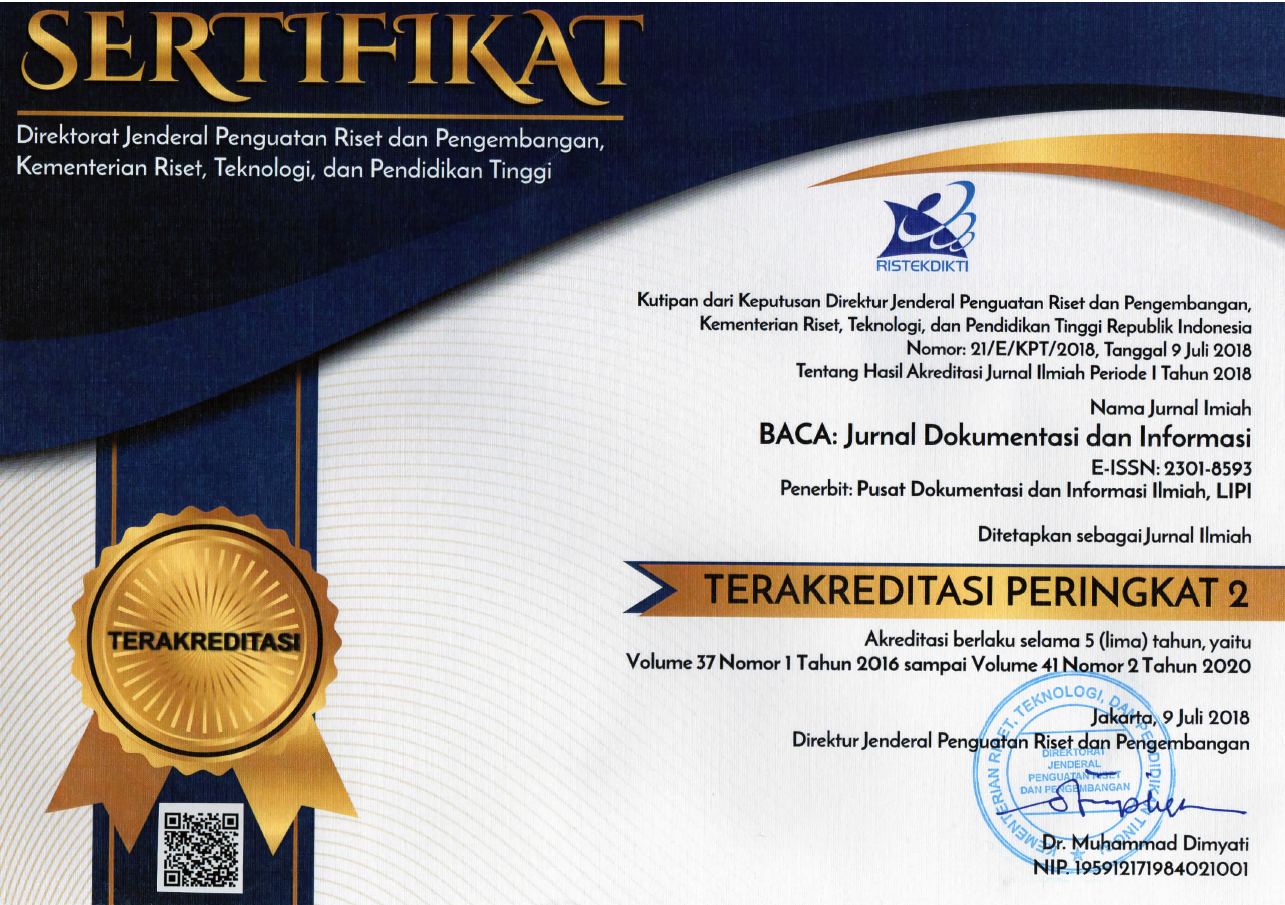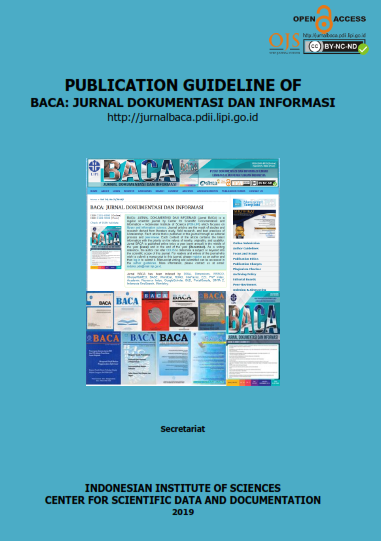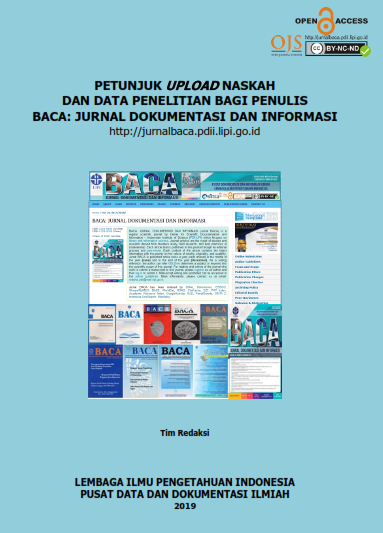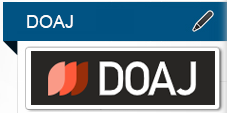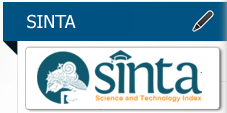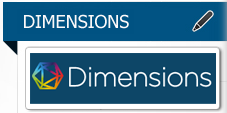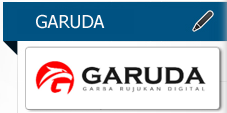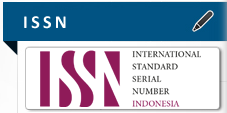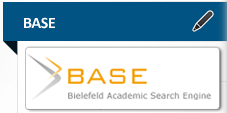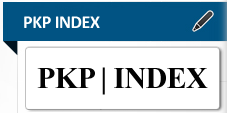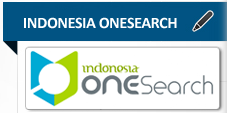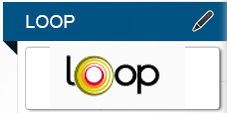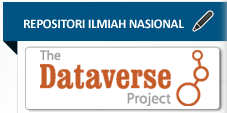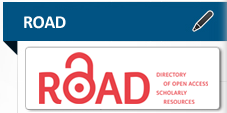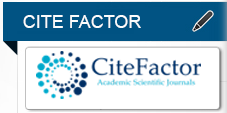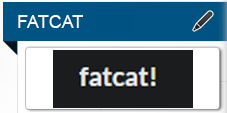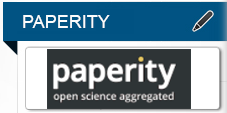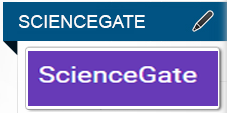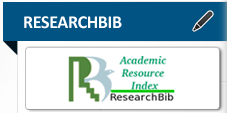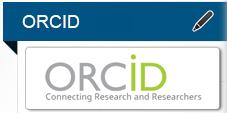EVALUASI GUIDELINE DAN E-LEARNING DIGITAL LITERACY MENGGUNAKAN MODEL CIPP
Abstract
This study aims to evaluate digital literacy guidelines based on blended learning using the CIPP model (Contexts, Inputs, Processes, Products). The research method is simple experimental, namely by distributing questionnaires to users who have carried out trials on the system. The source of research data is librarians in the Center for Scientific Documentation and Information. Evaluation is measured by looking at the agreement and disagreement of users regarding the topic of training, completeness of the material, training time, and system quality. The results of the study show that the guidelines and e-learning are declared quite effective. However, there are still some disadvantages, among others, that there is still a small format of teaching material in applications, such as visual content, namely images, videos and audio to be used as reference for learning. In addition, an evaluation of the timing of training is needed.
Keywords
Full Text:
PDFReferences
Ayunda, W.A, Nurhadyani, Y., & Wijaya, S.H. 2018. Development Digital Literacy GuidelineFor Smart City (In Library Perspective). Paper presented at the 1th International Conference on Library and Information Science (ICLIS), UPI, Bandung, November 7-8.
Aziz, M. & Rehman, Z. 2018. Implementation of CIPP Model for Quality Evaluation at SchoolLevel: A Case Study. Journal of Education and Educational Development, 5(1), 189-206.
Bakhti, B.Y. 2017. Evaluasi Program Model CIPP Pada Proses Pe,belajaran IPA. Jurnal Inovasi Pendidikan Fisika dan Riset Ilmiah, 1(2), 75-82.
Bawden, D. 2008. Origins and Concepts of Digital Literacy, in C Lankshear & M Knobel (eds), Digital Literacies: Concepts, Policies and Practices. Peter Lang Publishing, 126(591), 388-405.
British Columbia Public Libraries. 2017. BC’sDigital literacyFramework. https://www2.gov.bc.ca/assets/gov/education/kindergarten-to-grade-12/teach/teaching-tools/digital-literacy-framework.pdf.
Hamilton, B. 2017. Library Lesson In Digital Citizenship: On Overview Of How The School Library Can Support Digital Citizenship In The Curriculum. http://ideas.demco.com/blog/library-lessons-digital-citizenship/.
Lankshear, C. & Knobel, M. 2006. Digital Literacy and Digital Literacies: Policy, Pedagogy, and Research Considerations for Education. Digital Kompetanse, 1(1), 12–24.
Lim, M. & Virginia, W.K. 2007. Online vs Blended learning: Differences in Instructional Outcomes and Learner Satisfaction. Journal of Asynchronous Learning Networks, 11(2), 27-42.
Mahmudi, I. 2011. CIPP: Suatu Model Evaluasi Program Pendidikan. Jurnal At-Ta’dib, 6(1), 111-125.
Maryuliana, S. & Haviana, S.F.C. 2016. Sistem Informasi Angket Pengukuran Skala Kebutuhan Materi Pembelajaran Tambahan Sebagai Pendukung Pengambilan Keputusan di Sekolah Menengah Atas Menggunakan Skala Likert. Jurnal Transistor Elektro dan Informatika, 1(2), 1-12.
Sekaran, U. & Bougie Roger. 2013. Research Methods for Business: A Skill Building Aproach, 7th Edition. USA: Wiley.
Setyaningrum, A. 2016. Implementasi Model Evaluasi CIPP pada Pelaksanaan Program Pendidikan dan Pelatihan di BPTT Darman Prasetyo Yogyakarta.
Sugiyono. 2017. Metode Penelitian Kuantitatif Kualitatif dan R&D.Edisi 23. Bandung: Alfabeta.
DOI: https://doi.org/10.14203/j.baca.v41i1.505
Copyright (c) 2020 BACA: JURNAL DOKUMENTASI DAN INFORMASI

This work is licensed under a Creative Commons Attribution-NonCommercial-NoDerivatives 4.0 International License.



